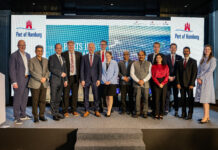
Maersk said that its customers continue to face a number of challenges as the Russia-Ukraine conflict weighs on the long-term outlook for the global economy amid concern that inflation and higher energy prices will lead to lower consumer demand, hurting international trade.
However, on a short-term level, the views seem more positive, the company states in its report, regarding the Asia Pacific market.
Cargo volumes through Shanghai are returning to pre-lockdown levels and demand from US consumers is driving forward the peak shipping season on North American trades.
Maersk said it continues to try to mitigate the impact of ongoing port congestion.
Among the actions it is taking to solve the problem are deploying extra freighters, rescheduling and launching services.
Global trade volumes fell 2.5% in May from a year earlier, and year-to-date growth is down by a similar level, although these come off last year’s increased levels.
Container imports into Europe were negatively affected by the conflict in Ukraine in terms of volumes, according to the Danish carrier, which noted that imports in Asia were down due to Covid-19 restrictions in China and a general slowdown in China’s housing market.
Finally, imports in North America were stable at a very high level.
With Shanghai gradually returning to normal after a two-month citywide lockdown in April and May, factory output is rising and demand rebounded well in July with positive signs of a seasonal peak in many trades.
Truck transport in the city area has also been fully restored. The current situation is dynamic and subject to change, the company notes.
“The situation in Shanghai is normalising but is still both fluid and hard to predict – this combined with the strikes in Europe and the continuous congestion in the ports in North America means that our customers have a larger need for flexibility and agility than ever. Our focus is on delivering just that to help support the fulfilment of their customer promises”, said Anne-Sophie Zerlang Karlsen head of Asia Pacific Ocean customer logistics.
Terminal congestion, especially in North America and Europe, continues to adversely affect schedule reliability.
Strikes in Germany, especially at Bremerhaven, Hamburg, and Wilhelmshaven, have exacerbated the disruption caused by vessel delays.
In the Netherlands and specifically in Rotterdam, Maersk is exploring various options to reduce congestion, including off-dock options, and redirecting cargo to facilities elsewhere such as Zeebrugge and Gdansk.
It is also bringing back some transatlantic and Asia-North America services either by changing the voyage numbers to reflect the actual departure dates or vessel sliding.




